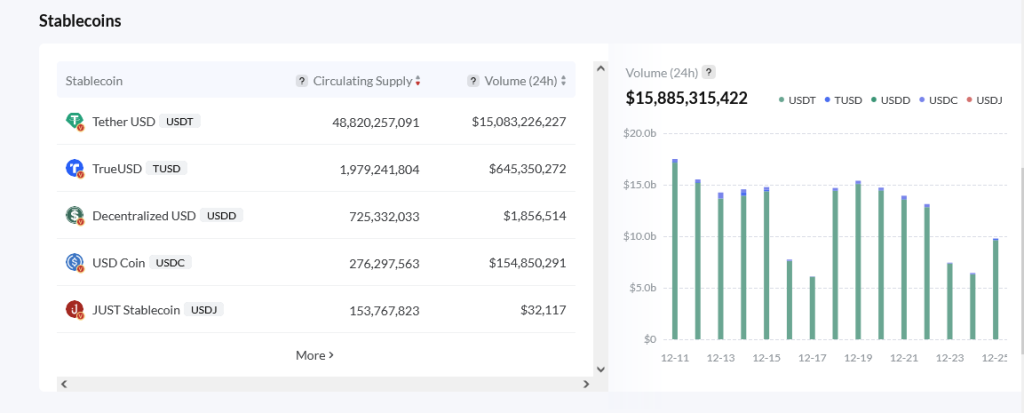According to Qiao Wang, the customer support at Alliance DAO, Tron is the blockchain that has best banked the unbanked around the world. Tron is a smart contract platform and one of the many competitors of Ethereum.
Tron Is “Banking The Unbanked”
Taking to X on December 25, Wang argues that Ethereum (ETH), Bitcoin (BTC), and Solana (SOL) are “too volatile, too expensive, or too new” to be used by people in developing countries. In Wang’s view, Tron is the only platform that has helped bank the unbanked because it is fast, cheap, and has been around longer than emerging but popular layer-1 platforms like Solana, for instance, or even layer-2 options like Arbitrum and Optimism.
Wang proceeded to cite on-chain data and specifically stablecoin activity which demonstrates that most USDT activity is domiciled on Tron. Notably, the analyst continues to say that most people interviewed or consulted actively use USDT on Tron to make payments and send money to their families. Further enablers in this value chain include critical peer-to-peer (P2P) portals like Binance P2P and Paxful.
Tron’s success, especially its dominance in stablecoin activity, can be attributed to multiple factors. One of them is how the platform is structured. Improving on Ethereum and aiming to address scaling challenges, Tron offers an improvized model designed to process more transactions cheaply. Moreover, the platform was one of the first to support USDT.
Considering rampant congestion and high fees on Ethereum, most USDT trading activity migrated to Tron, where the network gradually gnawed market share, acting as the main facilitator of USDT transfers. The low cost of transactions could explain its rising appeal, especially for people in developing countries.
Justin Sun: The Goal Is To Serve The World
Nic Carter, a partner at Castle Island Ventures, agrees with Wang that Tron is a good choice for banking the unbanked. Even so, Carter said a lot of intermediation is happening in the stablecoin space with platforms like Fintechs and banks acting as critical interfaces in minting or custodying collateral. Because of the role of these centralized platforms, Carter argues that it will eventually “end the era of consumer blockchains” like Tron.
Chiming into the conversation, Justin Sun, the co-founder of Tron, said the platform aims to eventually serve 8 billion people around the world. Moreover, Sun added that Tron is “still in the early stages of developing this vision” but is committed to actualizing their objective.

According to TronScan data on December 26, there are over $48.8 billion USDT in circulation. Meanwhile, there are $39.7 billion of USDT circulating on Ethereum, according to Etherscan.
Feature image from Canva, chart from TradingView
